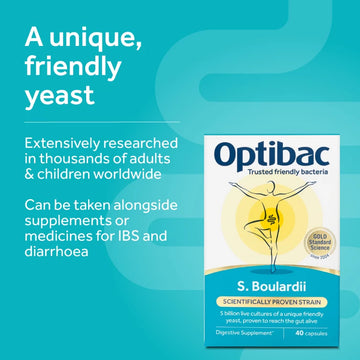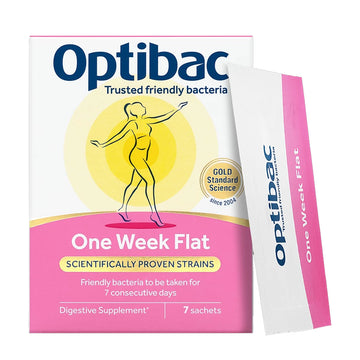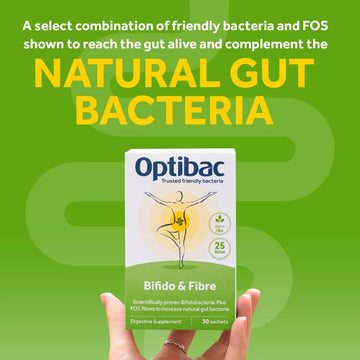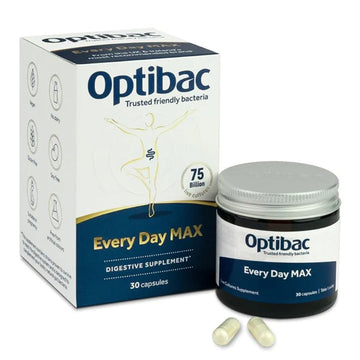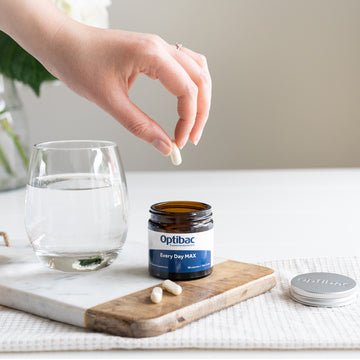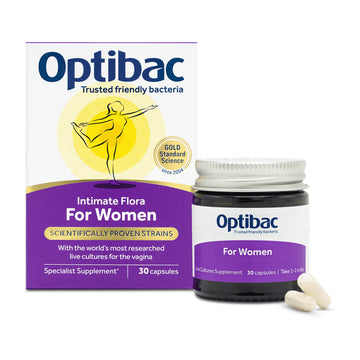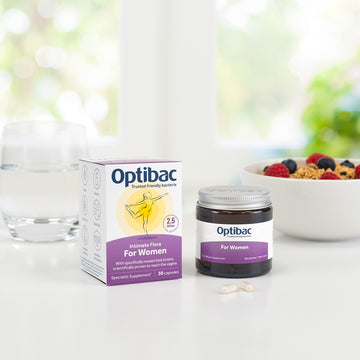IBS (Irritable Bowel Syndrome) is common condition but it's often not discussed. It comes with some uncomfortable symptoms such as constipation and diarrhoea so a lot of sufferers aren't too keen to highlight their own struggles. While there's no one cure or magic fix, there are some things you can do to help. Today we're taking a look at the common question: Do probiotics help with IBS symptoms? The quick answer is yes! We've rounded up some probiotics that can help tackle common symptoms.
What is IBS?
IBS is a common but distressing condition that affects the digestive system. It often impacts negatively on a person’s quality of life. Women are more likely to be affected than men. There are many different triggers such as stress, certain medications, hormonal fluctuations and poor dietary choices. Symptoms are often different from person to person, but in general sufferers would tend towards either:
- constipation
- diarrhoea (or a mixture of constipation and diarrhoea)
- stomach pain
- bloating
IBS is generally divided into three types:
- IBS-C - IBS with constipation
- IBS-D - IBS with diarrhoea
- IBS-M - IBS mixed
Do Probiotics Help with IBS symptoms?
So do probiotics help with IBS symptoms? And if so, how? Firstly, probiotics are sometimes referred to as ‘friendly’ bacteria. They can support the immune system and digestive system by increasing the number of good bacteria in the gut, while fighting off the bad bacteria.
Probiotics have been shown in many clinical trials to help with the diverse symptoms associated with IBS such as pain, cramping, constipation, diarrhoea and bloating. Unfortunately, no one probiotic strain appears to alleviate the whole cluster of symptoms that often present with this condition. Clinical trials have shown that various strains can help with different aspects of IBS.
When choosing a probiotic for IBS, it's therefore advisable to choose one that has been well researched. It should be researched as a complete formulation or for your predominant symptom, or IBS type.
The OptiBac Probiotic range contains several formulations that have clinical trials showing efficacy at managing one or more of the different symptoms of IBS. We're going to take a look at symptoms in further detail below and probiotics that may be able to help you manage these symptoms.
Abdominal cramping/pain
One of the most common symptoms IBS sufferers face is abdominal cramping/pain. This symptom is often present regardless of whether a sufferer has IBS-C or IDS-D.
How to treat:
Human trials have indicated that Lactobacillus acidophilus NCFM strain of probiotic bacteria has been shown to substantially reduce pain and cramping. When coupled with Bifidobacterium lactis Bi-07, L. acidophilus NCFM has also been shown to reduce abdominal distension and bloating associated with IBS.
Both of these strains of bacteria can be found in Optibac – For Every Day EXTRA Strength, making it a great option for most IBS sufferers.
Constipation
Constipation is another distressing symptom that is common amongst IBS sufferers. Do probiotics help with IBS symptoms such as constipation? Thankfully, yes, probiotics can also help with the management of this uncomfortable health complaint. Not all strains of probiotic offer the same protection though, so it's important to find a strain of bacteria that has been specifically researched with constipation in mind.
How to treat:
Bifidobacterium lactis BB-12 is the most researched strain of bacteria for use in constipation, and shows some impressive results. The B. lactis BB-12 strain was put to the test in a research project that used over 1,200 participants from all over Europe, including France, the UK and Germany. The subjects were selected from a volunteer database, each of which were otherwise healthy, but had reported symptoms of low defecation frequency and abdominal discomfort.
The volunteers were split into 3 groups. The first received 1 billion dose of B. lactis BB-12 once daily. The second group received 10 billion dose of B. lactis BB-12 once daily, and the third group received placebo. The groups were tested for a period of 4 weeks.
Results suggested that Bifidobacterium lactis BB-12 should certainly be considered as part of a solution to improve bowel regularity. The 1 billion B. lactis BB-12 group revealed the most statistically impressive result, improving defecation frequency from 3 days a week to 4.5 days a week, meaning that the participants (on average) had a bowel movement on an extra one and a half days per week than those in the placebo group.
Diarrhoea
Whilst many IBS sufferers have constipation as their prevalent symptom, just as many have diarrhoea instead. This symptom can be an on-going, daily nuisance. It may be unpredictable, with periods of ‘calm’ followed by a sudden flare up. Whatever the pattern, there is a probiotic that can help.
How to treat:
Saccharomyces boulardii is a probiotic yeast, that has over 50 years of clinical research behind it. It is useful in most cases of diarrhoea, whether the cause is a stomach bug, food poisoning, ‘travellers tum’, antibiotic use, or IBS. Saccharomyces boulardii is often recommended in many hospitals throughout mainland Europe when a patient is suffering with diarrhoea.
There are 5 Billion live cultures of Saccharomyces boulardii in OptiBac Probiotics Saccharomyces Boulardii. This makes it an excellent choice for sufferers of IBS-D.
Bloating
Most people with IBS suffer with some bloating. At certain times the bloating can really ‘flare up’, when aggravated by factors such as stress, or eating particular foods.
How to treat:
During a particularly bad period of bloating, the probiotic One Week Flat (which is a 7 day probiotic supplement), may be helpful. This product is designed to particularly help with symptoms of bloating, as well as support gut health in general.
OptiBac Probiotics One Week Flat contains Lactococcus lactis Rosell-1058, a probiotic strain which produces two specific enzymes to help with digestion of foods which often exacerbate bloating. α-glucosidase can help to digest starch (for example bread, pasta), and ß-galactosidase can help to digest lactose (such as milk, ice cream). This supplement also contains L. acidophilus Rosell-52. This has been shown to reduce the negative effects of stress on the body. This is often a trigger in IBS.
Managing IBS with Probiotics & Lifestyle Factors
So to conclude, taking well-researched probiotics can help manage IBS symptoms. Sufferers can greatly improve their quality of life and lessen the unpleasant digestive symptoms.
It's important, however, that other factors are also taken in to consideration such as diet, exercise and finding ways to relax. IBS is a complex condition, and requires a multi-pronged approach in its management.
But the good news is that sufferers can gain considerable relief when they follow a whole mind and body approach, and address both the psychological triggers as well as the physical symptoms. Read more about IBS Triggers and Prevention.
Please note, this blog is for informational purposes only and should not replace medical advice.
It’s always best to consult your doctor before taking any new supplements, treatments or remedies if you are pregnant, breastfeeding or on medication.
Author: Kathy Wheddon
Checked and updated: 5 September 2021






